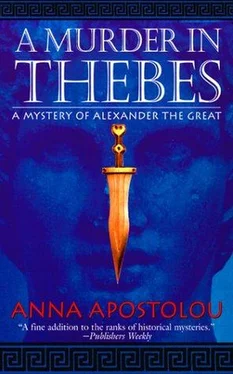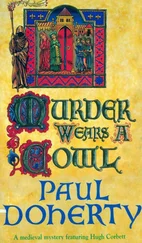Paul Doherty - A Murder in Thebes
Здесь есть возможность читать онлайн «Paul Doherty - A Murder in Thebes» весь текст электронной книги совершенно бесплатно (целиком полную версию без сокращений). В некоторых случаях можно слушать аудио, скачать через торрент в формате fb2 и присутствует краткое содержание. Год выпуска: 2013, ISBN: 2013, Издательство: Headline, Жанр: Исторический детектив, на английском языке. Описание произведения, (предисловие) а так же отзывы посетителей доступны на портале библиотеки ЛибКат.
- Название:A Murder in Thebes
- Автор:
- Издательство:Headline
- Жанр:
- Год:2013
- ISBN:9780755395736
- Рейтинг книги:4 / 5. Голосов: 1
-
Избранное:Добавить в избранное
- Отзывы:
-
Ваша оценка:
- 80
- 1
- 2
- 3
- 4
- 5
A Murder in Thebes: краткое содержание, описание и аннотация
Предлагаем к чтению аннотацию, описание, краткое содержание или предисловие (зависит от того, что написал сам автор книги «A Murder in Thebes»). Если вы не нашли необходимую информацию о книге — напишите в комментариях, мы постараемся отыскать её.
A Murder in Thebes — читать онлайн бесплатно полную книгу (весь текст) целиком
Ниже представлен текст книги, разбитый по страницам. Система сохранения места последней прочитанной страницы, позволяет с удобством читать онлайн бесплатно книгу «A Murder in Thebes», без необходимости каждый раз заново искать на чём Вы остановились. Поставьте закладку, и сможете в любой момент перейти на страницу, на которой закончили чтение.
Интервал:
Закладка:
“And you know how dangerous it would be to spread such gossip?”
“I know,” he stammered.
Miriam watched those deep, watery eyes.
“So, why are you here, Timeon of Athens? At the banquet the other night you were more sure of yourself, issuing challenges. Now you’ve come here all atremble, wanting to speak to me, the Israelite woman.” Miriam studied his pallid face. “You’ve had fresh letters from Athens, haven’t you? The news of Thebes’ destruction has reached there. The pro-Macedonian faction is now in power; they don’t want you to do anything to upset Alexander now that Demosthenes and his demagogues have fled.”
Timeon just blinked.
“And, of course, you are wondering about yourself. After all, you were appointed official envoy when Demosthenes was cock of the walk in the Agora of Athens.”
“They say you have a bitter tongue.”
“Do they now, Timeon, so why are you here?”
“They also say you are fair and can’t be bribed.”
“You want me to act as mediator?”
Timeon nodded.
“If you could,” he paused, “if you could assure the king that what has happened in Thebes is not the work of Athens or its envoys.”
“Well, of course I will,” Miriam retorted coolly, “I mean, if that’s the truth.”
“It is, it is!”
“Then why are you so nervous?”
Timeon spread the fingers of his right hand.
“All of Greece has changed,” he murmured. “The wolf was bad, but the cub is even worse.” He lifted his head. “When Philip died we thought the power of Macedonia would collapse with him. There would be the usual bloodletting and Alexander would disappear. Now it’s all changed. Demosthenes was wrong. I do not wish to be crucified. And the Athenians don’t want a lake of ash where their city once stood.”
“Athens is safe.” Miriam hid her excitement. This treacherous envoy was going to offer her something. He wouldn’t dare go to Alexander or his companions: their moods were unreliable, their tempers savage.
“Everything has a price Timeon,” she declared. “And, as Aristotle said, even the gods can’t change the past. What I am interested in is what you are going to tell me. You are going to offer me something, aren’t you? I’ve read your playwright Aristophanes; he says you cannot make a crab walk straight. Perhaps he should have written, ‘you cannot make an Athenian tell the truth.’”
“And the wisest of the wise may err,” Timeon snapped back.
“Aristophanes?” Miriam asked.
“No, Aeschylus!” Timeon made to get up.
“Sit down, man!” Miriam soothed. “You’ve come here to buy Alexander’s good will, yes? To give him reassurance that you are not involved in what has happened, whatever that may be!”
Timeon pulled his cloak around him and nodded.
“And you’ve come to me,” Miriam continued, “because what you’ve got to say is very dangerous, isn’t it?”
Timeon breathed in rapidly.
“I have your word of honor?”
“You have my word,” Miriam declared.
“In Athens,” Timeon spoke hurriedly, “the news arrived that Alexander was dead and his army destroyed and that Olympias was facing a revolt in Pella. Demosthenes was ecstatic. The Thebans sent envoys and our council met with them in the dead of night. The Thebans said they had a high-ranking spy in the Cadmea, that they were going to throw off the Macedonian yoke, expel or kill the garrison, and rise in revolt. Wiser minds in our council urged caution. The Thebans were furious. We asked for proof, for the name of this spy. The Thebans were most reluctant. Demosthenes didn’t have it all his own way. Again the demand was made, and the Thebans replied that the Athenians would know the name well. When questioned further, the Theban envoy simply replied, ‘Haven’t you heard of Socrates’ pupil?’”
“Socrates’ pupil?” Miriam queried.
“That’s all they said. The envoys left and the council voted. Demosthenes wanted to send troops immediately to help Thebes but we were not so certain.”
“So you adopted a wait-and-see policy?”
“Of course we did,” Timeon retorted, “as did all of Greece.”
“And there’s more?” Miriam asked.
“Yes, there is.” The Athenian looked anxiously about. “Could I have a cup of wine?”
Miriam poured one and thrust it into his hands.
“When Alexander lay siege to Thebes, Demosthenes sent me here with strict instructions to keep Athens closely informed. Of course, I did. After all, I am only an envoy.”
“Of course,” Miriam echoed.
“Well, you know what happened. Thebes fell, the face of Greece changed for ever. Demosthenes lost control in Athens. Two days ago I received a mysterious message. I left the camp accompanied by one of my squires. We had to meet the sender in the olive grove near the shrine of Oedipus.”
“Why did you go?” Miriam interrupted.
“The note, which I’ve destroyed, simply said it was in the interest of a son of Athens, for had not both Sophocles and Oedipus found refuge in this city? We met at dusk; it was easy to slip out without Hecaetus noticing. The figure was shadowy; I could smell woman’s perfume on him.”
“How did his voice sound?”
“More a whisper, a hiss, as if he was holding something over his mouth. Despite the perfume, the voice was unmistakably male. He asked two things. One, was the city of Athens still interested in the Crown of Oedipus?” Timeon shrugged, “I said I didn’t know. And two, more important, would the city publish the truth if it was stolen? Again I replied that I didn’t know.”
“What happened then?” Miriam insisted.
“I told him that Athens was still a member of the League of Corinth and owed allegiance to Alexander of Macedon. The stranger became very angry. I wanted to question him further, but he disappeared; that’s all I know.”
“Is it?” Miriam asked.
Timeon held his right hand up.
“I swear by Apollo, by all that is holy, that that is all I know.”
Simeon pulled back the tent flap and entered. Miriam beckoned for him to leave. She could tell by the look of concern on Timeon’s face that he wanted no witnesses. The Athenian leaned forward.
“If Alexander learned this from any other source,” he hissed, “he would have my head, but Athens had no hand in it and does not wish to be involved.” And pulling up his hood, Timeon left the tent.
Miriam waited for her brother to reenter.
“We have a name,” she declared. “The Thebans believe that the Oracle was a ‘true son of Athens,’ a disciple of Socrates.”
“In which case,” Simeon replied, “Alexander should arrest Aristotle or Plato or dig up all the corpses. Miriam, that means nothing! Socrates and his circle have been dead for years!”
Miriam sat, eyes closed. She recalled the histories of Athens.
Simeon’s jaw sagged.
“Of course, Miriam! Alcibiades was one of those whom Socrates was accused of corrupting. He became a power in Athens during the war against Sparta. He led the disastrous expedition to Sicily and later sought exile in Persia. The Oracle wasn’t referring to the historical Alcibiades but to Memnon’s officer.”
Miriam tried to control her excitement. Alcibiades could provide the explanation for everything, she thought: He was foppish, petulant, probably a transvestite. It would have been easy for him to go around Thebes pretending to be a woman and attending secret, shadowy meetings with members of the Theban council.
Miriam recalled what the page had told her. How he had glimpsed a man dressed as a woman coming down the stairs of the tower. Was he the same one Lysander had glimpsed?
“Brother,” she urged, “send a courier to the Cadmea. Tell those officers I want to meet them again, urgently. Oh and this time let us bring some soldiers.”
Читать дальшеИнтервал:
Закладка:
Похожие книги на «A Murder in Thebes»
Представляем Вашему вниманию похожие книги на «A Murder in Thebes» списком для выбора. Мы отобрали схожую по названию и смыслу литературу в надежде предоставить читателям больше вариантов отыскать новые, интересные, ещё непрочитанные произведения.
Обсуждение, отзывы о книге «A Murder in Thebes» и просто собственные мнения читателей. Оставьте ваши комментарии, напишите, что Вы думаете о произведении, его смысле или главных героях. Укажите что конкретно понравилось, а что нет, и почему Вы так считаете.












